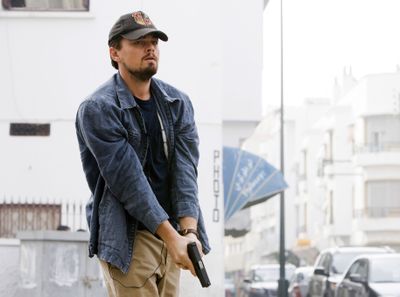The most worthwhile in the genre
’Body of Lies’ strongest of war on terror films

Several movies have tackled the war on terror, but nobody has wanted to see any of them, either because the topic is too daunting or too much of a downer, or it’s simply still too soon after 9/11.
Add “Body of Lies” to that list, even though it’s probably the most worthwhile and least preachy of the bunch.
The pieces would all seem to be in place: strong work from acting heavyweights Russell Crowe and Leonardo DiCaprio; an intricate script from William Monahan, Oscar winner for “The Departed”; and the virtuoso visual styling of director Ridley Scott.
Of course, it looks great as it bounces breathlessly between Iraq and Jordan, Qatar and the Netherlands, Dubai and the Virginia suburbs; Scott seamlessly blends footage shot by overhead drones with intense, paranoid sequences from the cramped streets below. And yet the result, with its many explosions and shootouts, too often feels like a generic action picture, albeit one with weightier stuff on its mind.
It’s as if Scott & Co. felt they needed to make the material palatable to the widest possible audience by turning it into a familiar genre picture, rather than sticking to their guns and making, well, “Syriana.”
Based on the novel of the same name by Washington Post columnist David Ignatius, whose knowledge of the subject matter would seem to be unimpeachable, “Body of Lies” follows undercover CIA operative Roger Ferris (DiCaprio), who’s trying to ferret out the mastermind behind a series of anonymous bombings around the world. At the same time, Ferris’ boss, Ed Hoffman (Crowe), is running surveillance and plotting strategy from home back in the United States with the help of his ever-present cell-phone headset and laptop.
But despite their shared goals and mutual dependence, Ferris and Hoffman often end up miscommunicating and undermining each other. This becomes especially true when Ferris tries to chat up the smooth Jordanian intelligence chief (Mark Strong, who nearly steals the whole movie), a man who holds Hoffman in disdain and has been reluctant to aid in the CIA’s efforts.
Somehow, with all his copious free time, Ferris manages to romance Aisha (Golshifteh Farahani), a pretty, soft-spoken nurse who treats his wounds when he gets particularly banged up during a chase in Amman. It’s obvious what the purpose of the relationship is – it’s a device meant to flesh out Ferris and reveal whatever glimmers of humanity he may have left in this deadly world – but it feels distractingly wedged-in.
Far more intriguing, and believable, is the relationship between Ferris and Hoffman. It’s a joy to watch DiCaprio and Crowe verbally sparring, even though they infrequently share the same space. DiCaprio is high-strung and arrogant; Crowe is low-key and arrogant and, in typically Method fashion, he put on 50 pounds for the part, and added a Southern drawl.
Each character thinks that what he’s doing is the right course for the greater good. But when you break down “Body of Lies” to its most fundamental elements, it’s really about disagreeing with your boss. Hoffman gives Ferris an assignment, Ferris carries it out how he sees fit, they clash, then they start all over again.
– By Christy Lemire, Associated Press
“City of Ember”
“City of Ember” is a not-quite-classic addition to the dystopian genre, a tale that gets away with being derivative and somewhat prone to trite “thrill ride” action sequences. It could be the first dystopia many a ’tween or early teen moviegoer experiences, a movie about teenagers trying to save the human race.
“On the day the world ended,” a narrator tells us, learned men in blue lab coats sent the last vestiges of the human race below ground to hold out for 200 years in the City of Ember. But those 200 years have passed. Knowledge has faded and the vast city is crumbling, degenerating as generations have grown up not really understanding how anything works, why they’re underground or what was supposed to happen after 200 years.
The canned food supplies are running out. The generator that runs the lights is flickering. “Time,” as the ticking clock we hear tells us, “is running out.”
Whom do you turn to? The Mayor (Bill Murray) is a corrupt empty suit, ruling by tacit fear of the unknown (“Ours is the only light in a dark world”) and promising to have a “task force” look into the generator problem.
But Lina (Saoirse Ronan of “Atonement”) and Doon (Harry Treadaway of “Control”) aren’t giving up or accepting the official government line. She delves into the mystery of a missing box of instructions for the city. And Doon, the son of a tinkerer (Tim Robbins) ignores his aged, “it’s not my job” boss in the pipe works (Martin Landau) and tries to get to the generator to have a crack at fixing it.
This dark and ambitiously simple adaptation of the Jeanne Duprau novel, by the great screenwriter Caroline Thompson (“Edward Scissorhands”), is both light entertainment and smart, subversive literature, urging the young to think for themselves, question authority and make their own destiny.
– By Roger Moore, The Orlando Sentinel
For times and locations, see page 9.